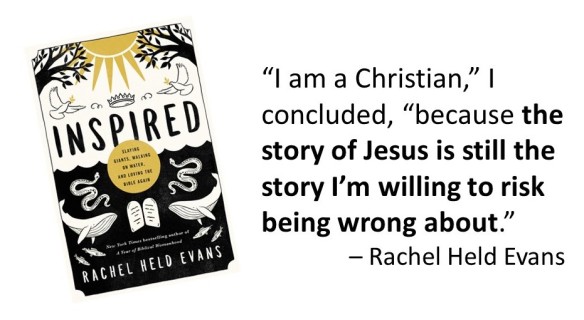Recently I posted the following on social media:
I’m a Christian, a follower of Jesus. Of course I believe in hell.
But do I believe in a post-mortem lake of fire where people are tortured eternally for not believing the right things? Absolutely not. That’s utterly unchristian and foreign to the way of Jesus.
But I was being tricksy.
I was intentionally trying to get a reaction from both the “fundamentalists” and the “progressives.” Christian fundamentalists, of course, believe exactly what I deny in the second part, and they think this belief is the historically orthodox, biblical, properly Christian understanding of hell (it isn’t). And Christian progressives—or at least the most progressive of progressives—don’t believe in any kind of hell at all. Some ultra-progressives don’t even have any place for sin in their theological framework.
But it’s really hard to be a “follower of Jesus” in any meaningful way and deny the reality of hell. After all, Jesus talks about it quite a bit in the Gospels, mostly as gehenna, and given the location of that concept historically—and even geographically—it’s quite likely this memory accurately reflects the historical Jesus of Nazareth.
But there’s also nothing in Jesus’ teaching in the Gospels that supports the idea that God sends people to a place of eternal torture because they don’t believe the right things about Jesus or God or salvation. In spite of the prooftexts that some might trot out.
So what do I think about hell? A few thoughts.
First, for Jesus in the Gospels, “hell” is pretty consistently for those who abuse their power by harming those who have less power.
A few examples:
“If your right eye causes you to sin, tear it out and throw it away; it is better for you to lose one of your members than for your whole body to be thrown into hell. And if your right hand causes you to sin, cut it off and throw it away; it is better for you to lose one of your members than for your whole body to go into hell” (Matt 5:28-29).
This ⬆️ is for men who lust after women—in a patriarchal culture where men have power over women and women have little power over men. It’s telling, then, that Jesus doesn’t command women to “dress modestly”; rather, he calls out men for their objectification and sexualization of women’s bodies.
“If your hand or your foot causes you to sin, cut it off and throw it away; it is better for you to enter life maimed or lame than to have two hands or two feet and to be thrown into the eternal fire. And if your eye causes you to sin, tear it out and throw it away; it is better for you to enter life with one eye than to have two eyes and to be thrown into the hell of fire” (Matt 18-8-9).
This ⬆️ is for those who cause children to “stumble”—probably at least a reference to keeping children from coming to Jesus, though possibly a more sinister reference to child abuse. Either way, it’s an abuse of power over those without power, again in a patriarchal culture where men were at the top of the heap and children among those at the bottom.
“The rich man also died and was buried. In hell, where he was being tormented, he lifted up his eyes and saw Abraham far away with Lazarus by his side” (Luke 16:23).
This ⬆️ is Jesus’ story of the rich man and Lazarus—and the rich man is in hell (here “Hades,” the realm of the dead) because he had refused to help the poor man at his gates. “Woe to you rich,” Jesus has already warned in Luke’s Gospel, “for you have received your consolation. Who to you who are full now, for you will be hungry.” (6:24-25).
“Then he will answer them, ‘Truly I tell you, just as you did not do it to one of the least of these, you did not do it to me.’ And these will go away into eternal punishment but the righteous into eternal life” (Matt 25:45-46).
This ⬆️ is Jesus’ story of the sheep and the goats—and the “goats” who go to “eternal punishment” are those who have the means to care for the poor, the stranger, the sick, and the imprisoned, and yet they refuse to do so.
You get the idea.
Second, for Jesus in the Gospels, “hell” is most often a translation of the word gehenna—and for those instances where that’s not the case, the idea of gehenna is probably not far away.
I’ve got a separate blog post on this, but here’s the executive summary.
Gehenna is a reference to the Valley of Hinnom, a literal valley on the south side of Old Jerusalem. It was the place where, at particularly horrible times in ancient Israel, children were burned in sacrifice to other gods—epitomizing the depths of injustice present in Israelite society at the time. These “fires of gehenna” were not lit by God but by people with power pursuing idolatry and injustice. Yet God warned that one day this valley would burn with the corpses of these violent powers-that-be, when the Babylonian empire came a-conquering. And so gehenna came to be a symbol of God “turning the tables” on abusers of power, abusers of the powerless.
Are you seeing a theme?
Third, for Jesus in the Gospels, even this “hell-as-gehenna, as a just punishment for abusers of power over others” probably involves some good ol’-fashioned symbolism and hyperbole.
As a teacher of wisdom, Jesus was not averse to hyperbole. Right in the context of the first example above you’ve got exaggeration for effect: eyes being gouged out and hands being cut off. And as an apocalyptic prophet, he was not averse to apocalyptic-prophetic imagery, which was highly symbolic. Beasts are not literal beasts, multiple heads are not literal heads, and “eternal fires of hell” are neither literal fires, nor literally without end.
Don’t misunderstand: neither hyperbole nor symbolism mean that the thing they are describing is “not real” or “not true.” Rather, they are telling the truth, but telling it slant, to borrow from Emily Dickinson.
The hyperbole and vivid imagery catch your attention. They tell you, “This is important, listen up!” They point to some very real truths—in this case how much God hates it when people abuse their power and harm those under their power, and that one day these abusers will face the consequences. But it’s not in a literal lake of fire, being eternally tormented.
I would say that, generally, this understanding of “hell” holds true for later, similar descriptions of “hell” in the New Testament, where the word gehenna is not directly used. Regardless, this is what “hell” meant for Jesus.
So yes, as a follower of Jesus I believe in hell. And, like Jesus, I say woe to you who are abusing your wealth and power, causing harm to those without wealth and power—you’ve got a hellish time coming your way, whatever that might look like. For the sake of those you are harming—and your own sake—turn from your wicked ways, make restitution to those you have harmed, and follow Jesus in his way of love.



 I learned the first hard truth early in my experiences of leadership. I learned the second hard truth in my last stint as a pastor, and I experience it in my new role as a regional church leader. There are some people who simply don’t want to have a conversation with leadership about issue X, Y, or Z, even though they have strong feelings about X, Y, or Z which are at odds with their perception of “where leadership is going.”
I learned the first hard truth early in my experiences of leadership. I learned the second hard truth in my last stint as a pastor, and I experience it in my new role as a regional church leader. There are some people who simply don’t want to have a conversation with leadership about issue X, Y, or Z, even though they have strong feelings about X, Y, or Z which are at odds with their perception of “where leadership is going.” “Christian” nationalism adds the expectation that the nation reflect specific values deemed to be Christian, in its constitution, laws, policies, and so on. Typically it means that these things should be based on biblical laws or teachings, especially the Ten Commandments.
“Christian” nationalism adds the expectation that the nation reflect specific values deemed to be Christian, in its constitution, laws, policies, and so on. Typically it means that these things should be based on biblical laws or teachings, especially the Ten Commandments.







 But politics according to Jesus does intersect with the politics of the world. When Jesus proclaimed the “kingdom of God,” he was claiming an alternative vision to the kingdoms of the world. When he brought “good news to the poor,” he was declaring a very different “good news” than that claimed by the Roman Empire. And all that Jesus-y stuff I listed in the previous paragraph? That’s the stuff that our politics—the ordering of society, collectively making decisions—is concerned with.
But politics according to Jesus does intersect with the politics of the world. When Jesus proclaimed the “kingdom of God,” he was claiming an alternative vision to the kingdoms of the world. When he brought “good news to the poor,” he was declaring a very different “good news” than that claimed by the Roman Empire. And all that Jesus-y stuff I listed in the previous paragraph? That’s the stuff that our politics—the ordering of society, collectively making decisions—is concerned with.